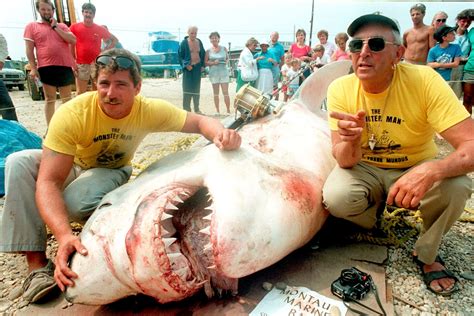
A massive great white shark, believed to be one of the largest ever recorded and nicknamed the “Queen of the Ocean,” is currently being tracked as she ventures closer to popular tourist destinations, raising both excitement and caution among marine researchers and local authorities.
The colossal shark, known as Nukumi, measures over 20 feet in length and weighs approximately 3.5 tons. She has been tracked by OCEARCH, a non-profit organization dedicated to marine research, for several years. The organization uses sophisticated tracking technology to monitor the shark’s movements and gather data about her behavior, migration patterns, and overall health. Nukumi’s recent trajectory indicates a potential approach to areas frequented by tourists, prompting OCEARCH to issue advisory alerts and work with local communities to ensure public safety. While great white shark encounters are relatively rare, the sheer size of Nukumi commands respect and highlights the importance of understanding and respecting marine ecosystems.
Nukumi, officially tagged as OC-046, was initially captured and tagged by OCEARCH in Nova Scotia back in November 2020. At the time of tagging, she measured 17 feet 2 inches long and weighed 3,541 pounds, making her the largest white shark OCEARCH had ever tagged in the Northwest Atlantic. “She is a very old shark, a mature shark,” OCEARCH Chairman Chris Fischer said at the time, suggesting she could be over 50 years old, a prime reproductive female, and a key contributor to the population’s health. The name Nukumi comes from the Mi’kmaq people, representing the wise grandmother figure.
Since being tagged, Nukumi has traveled extensively along the eastern coast of North America, offering researchers unprecedented insights into the movements of these apex predators. Her tracking data shows seasonal migration patterns, with movements influenced by factors such as water temperature, prey availability, and breeding cycles. Typically, these sharks inhabit colder waters off the northeastern United States and Canada during the summer months, then migrate south towards Florida and the Gulf of Mexico as winter approaches.
OCEARCH’s tracking data reveals that Nukumi has been spending time in warmer waters, which coincides with typical migration patterns for great white sharks during this time of year. Her proximity to tourist hotspots, while concerning to some, is not entirely unexpected. The waters off the coasts of states like Florida, Georgia, and the Carolinas are known aggregation points for various marine species, including sharks, during certain times of the year. These areas provide sharks with ample feeding opportunities, as they follow schools of fish and other marine life.
However, Nukumi’s size differentiates her from other sharks frequently observed in these waters. The potential impact of a shark of her size on local ecosystems and the risk, albeit small, to humans, necessitates careful monitoring and preventative measures. Local authorities are being urged to implement safety protocols, including increased patrols, public awareness campaigns, and clear guidelines for beachgoers to minimize the risk of encounters.
The data collected from Nukumi and other tagged sharks by OCEARCH is invaluable for conservation efforts. Understanding their migration patterns, habitat use, and feeding habits helps scientists to identify critical habitats that require protection. This information is essential for developing effective management strategies to ensure the long-term survival of these magnificent creatures.
Great white sharks play a vital role in maintaining the health of marine ecosystems. As apex predators, they help to regulate populations of other marine species, preventing any one species from becoming overly dominant. By preying on weaker or diseased animals, they also contribute to the overall health and resilience of the food web.
The presence of a large shark like Nukumi also highlights the ongoing recovery of great white shark populations in the Atlantic. Historically, these sharks were heavily hunted, leading to significant population declines. However, due to conservation efforts and stricter regulations, their numbers have been slowly increasing in recent decades. While this is a positive sign, continued monitoring and conservation efforts are crucial to ensure that their populations continue to thrive.
While concerns about safety are legitimate, experts emphasize that shark attacks are rare events. The vast majority of shark encounters do not result in injury, and fatalities are even less common. The International Shark Attack File (ISAF), which tracks shark attacks worldwide, reports that the risk of being attacked by a shark is extremely low. To put it into perspective, you are more likely to be struck by lightning or die in a car accident than to be attacked by a shark.
To minimize the risk of shark encounters, beachgoers are advised to take certain precautions, such as avoiding swimming at dawn or dusk, when sharks are most active; avoiding swimming in areas where fish are schooling or where seals are present; not wearing shiny jewelry that could attract sharks; and staying close to shore. Swimming in groups is also recommended, as sharks are less likely to approach a group of people.
OCEARCH continues to closely monitor Nukumi’s movements, providing real-time updates to the public and working with local communities to promote responsible behavior. The organization’s website and social media channels provide valuable information about shark behavior, safety tips, and the latest tracking data.
Nukumi’s journey serves as a reminder of the importance of understanding and respecting the marine environment. These magnificent creatures play a crucial role in maintaining the health of our oceans, and it is our responsibility to ensure their continued survival. By promoting responsible behavior, supporting conservation efforts, and educating the public, we can coexist peacefully with these apex predators and protect the delicate balance of marine ecosystems.
The tracking data from Nukumi also provides valuable insights into the broader ecological dynamics of the Northwest Atlantic. Her movements reflect the interplay between environmental factors, prey availability, and life history traits. Studying these patterns helps scientists understand how climate change, pollution, and other human activities are impacting marine ecosystems.
The ongoing research on great white sharks like Nukumi is essential for informing conservation policy and management decisions. By gathering comprehensive data on their behavior, population dynamics, and habitat use, scientists can provide policymakers with the information they need to make informed decisions about protecting these important species and the ecosystems they inhabit.
The attention Nukumi is receiving also provides an opportunity to educate the public about the importance of marine conservation. Sharks are often misunderstood and feared, but they are actually fascinating creatures that play a vital role in maintaining the health of our oceans. By highlighting the importance of sharks and the threats they face, we can inspire people to take action to protect them and their habitats.
OCEARCH’s work extends beyond simply tracking sharks. The organization also conducts research on other marine species, including sea turtles, dolphins, and whales. By studying these animals, OCEARCH aims to gain a better understanding of the complex interactions within marine ecosystems and to develop strategies for protecting these ecosystems from the impacts of human activities.
The challenges faced by marine researchers in tracking and studying sharks are significant. Sharks are highly mobile animals that can travel long distances, making them difficult to follow. They also inhabit remote and often dangerous environments, requiring specialized equipment and expertise to study them effectively.
OCEARCH relies on a team of dedicated scientists, researchers, and volunteers to carry out its work. The organization also collaborates with other research institutions, government agencies, and conservation organizations to share data and expertise. This collaborative approach is essential for addressing the complex challenges of marine conservation.
The future of great white sharks and other marine species depends on our ability to understand and protect their habitats. By supporting organizations like OCEARCH and advocating for responsible environmental policies, we can help ensure that these magnificent creatures continue to thrive for generations to come. The story of Nukumi, the “Queen of the Ocean,” serves as a powerful reminder of the importance of marine conservation and the need to protect the delicate balance of our oceans.
Furthermore, Nukumi’s advanced age underscores the significance of protecting mature individuals within shark populations. Older sharks, like Nukumi, have a wealth of knowledge about their environment, including prime feeding locations and migration routes. This knowledge is crucial for the survival of the species and the overall health of the population. Protecting these older individuals helps to ensure that this valuable knowledge is passed on to future generations.
The public’s fascination with Nukumi also presents an opportunity to dispel common misconceptions about sharks. Sharks are often portrayed as mindless killers in popular culture, but in reality, they are complex and intelligent animals that play a vital role in maintaining the health of marine ecosystems. By providing accurate information about sharks and their behavior, we can help to reduce fear and promote understanding and respect for these magnificent creatures.
The economic impact of shark tourism is also worth noting. Many coastal communities rely on shark diving and other forms of shark-related tourism for their livelihoods. By protecting shark populations, we can help to ensure the long-term sustainability of these industries and the economic benefits they provide.
The increasing awareness of shark conservation issues is a positive trend. More and more people are recognizing the importance of sharks and the need to protect them. This growing awareness is leading to increased support for conservation efforts and stricter regulations to protect shark populations.
Nukumi’s journey is a reminder that we are all connected to the ocean. The health of the ocean is essential for the health of the planet, and we all have a role to play in protecting it. By making informed choices about our consumption habits, supporting sustainable fishing practices, and advocating for responsible environmental policies, we can help to ensure that the ocean remains healthy and vibrant for generations to come.
The use of technology in tracking and studying sharks is constantly evolving. Researchers are developing new and innovative tools, such as satellite tags, acoustic tags, and underwater cameras, to gather data on shark behavior and movements. These technologies are providing unprecedented insights into the lives of sharks and helping scientists to better understand their role in marine ecosystems.
The ongoing research on great white sharks is also contributing to our understanding of the evolution of these animals. Sharks have been around for millions of years, and they have evolved to become highly specialized predators. By studying their anatomy, physiology, and behavior, scientists can learn more about the evolutionary history of these fascinating creatures.
The challenges facing great white sharks are complex and multifaceted. They include habitat loss, overfishing, pollution, and climate change. Addressing these challenges requires a collaborative effort involving scientists, policymakers, conservation organizations, and the public.
Nukumi’s story also highlights the importance of international cooperation in marine conservation. Sharks are highly migratory animals that often cross international borders. Protecting these animals requires a coordinated effort involving multiple countries.
The success of shark conservation efforts depends on our ability to change public attitudes towards sharks. By promoting education, dispelling myths, and fostering a sense of respect for these animals, we can create a more positive perception of sharks and encourage people to support conservation efforts.
The future of great white sharks is uncertain, but there is reason for hope. By continuing to invest in research, conservation, and education, we can help to ensure that these magnificent creatures continue to thrive for generations to come. Nukumi, the “Queen of the Ocean,” serves as an inspiration and a reminder of the importance of protecting the delicate balance of our oceans.
The importance of responsible tourism in areas where sharks are present cannot be overstated. Tourists should always follow the guidelines and recommendations of local authorities and tour operators to minimize the risk of shark encounters and to avoid disturbing shark habitats. Supporting sustainable tourism practices helps to ensure that shark populations are protected and that local communities benefit from shark tourism.
Nukumi’s tracking data also provides valuable information about the impact of human activities on shark behavior. By analyzing her movements in relation to shipping lanes, fishing grounds, and coastal development, scientists can assess the extent to which human activities are affecting shark populations. This information can be used to develop strategies for minimizing the negative impacts of human activities on sharks and their habitats.
The ongoing research on great white sharks is also helping to improve our understanding of the role of sharks in the marine food web. Sharks are apex predators, meaning that they are at the top of the food chain. They play a crucial role in regulating populations of other marine species and maintaining the overall health of the ecosystem. By studying their feeding habits and their interactions with other species, scientists can gain a better understanding of the complex relationships within the marine food web.
The conservation of great white sharks is not only important for the health of the ocean, but also for the health of the planet. The ocean plays a crucial role in regulating the Earth’s climate, and sharks play a vital role in maintaining the health of the ocean. By protecting sharks, we are also helping to protect the planet from the impacts of climate change.
The story of Nukumi, the “Queen of the Ocean,” is a story of hope. It is a story of how we can work together to protect these magnificent creatures and the delicate balance of our oceans. By supporting research, conservation, and education, we can ensure that great white sharks continue to thrive for generations to come.
The dedication and passion of the researchers and volunteers at OCEARCH are truly inspiring. Their commitment to understanding and protecting great white sharks is making a real difference in the world. By supporting their work, we can help to ensure that these magnificent creatures continue to roam the oceans for years to come.
Frequently Asked Questions (FAQ)
1. Who is Nukumi, and why is she called the “Queen of the Ocean”?
Nukumi is a massive great white shark, officially tagged as OC-046 by OCEARCH, measuring over 20 feet in length and weighing approximately 3.5 tons. She is nicknamed the “Queen of the Ocean” due to her immense size, estimated age (possibly over 50 years), and her status as the largest white shark OCEARCH had ever tagged in the Northwest Atlantic at the time of her tagging in November 2020. Her name, Nukumi, comes from the Mi’kmaq people, representing the wise grandmother figure.
2. What is OCEARCH, and what is their role in tracking Nukumi?
OCEARCH is a non-profit organization dedicated to marine research, specializing in the study of apex predators like great white sharks. They use sophisticated tracking technology, including satellite tags attached to the sharks, to monitor their movements, behavior, migration patterns, and overall health. OCEARCH captured and tagged Nukumi in Nova Scotia in November 2020 and has been tracking her ever since, providing valuable data and insights into her life and movements. OCEARCH also shares data publicly to increase awareness.
3. Why is Nukumi’s proximity to tourist hotspots a concern, and what precautions are being taken?
While great white shark attacks are rare, Nukumi’s immense size and the potential for encounters near populated beaches necessitate caution. The main concern is the potential impact on local ecosystems and the, albeit small, risk to humans. Local authorities are urged to implement safety protocols, including increased patrols, public awareness campaigns, and clear guidelines for beachgoers. OCEARCH also issues advisory alerts based on Nukumi’s tracked location, advising caution in those areas. Swimmers are advised to avoid swimming at dawn or dusk, avoid areas where fish are schooling or seals are present, not wear shiny jewelry, and stay close to shore, and swim in groups.
4. What can individuals do to contribute to the conservation of great white sharks?
Individuals can contribute to great white shark conservation by supporting organizations like OCEARCH through donations or volunteer work. Educating themselves and others about sharks, dispelling common myths, and promoting responsible behavior in marine environments is crucial. This includes avoiding activities that could harm sharks or their habitats, such as polluting the ocean or engaging in unsustainable fishing practices. Making informed choices about seafood consumption, supporting sustainable tourism, and advocating for responsible environmental policies are other effective ways to help protect these magnificent creatures.
5. What are the long-term implications of tracking sharks like Nukumi for marine conservation?
Tracking sharks like Nukumi provides invaluable data for long-term marine conservation efforts. Understanding their migration patterns, habitat use, and feeding habits helps scientists identify critical habitats that require protection. This information is essential for developing effective management strategies to ensure the long-term survival of these species. It also allows researchers to assess the impacts of climate change, pollution, and other human activities on shark populations, and to inform policies aimed at mitigating these impacts. The data contributes to a broader understanding of marine ecosystems and how to protect their delicate balance.









